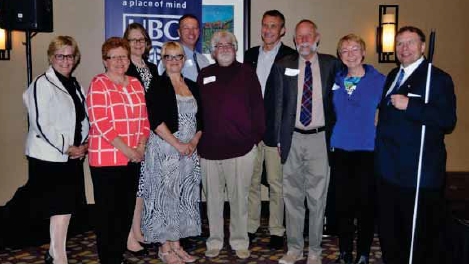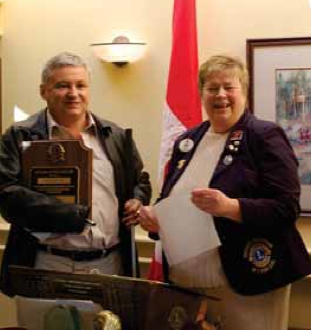Imagine riding in a windowless bus. Sometimes, if you know a route well enough, you
might be able to guess the location of the bus by the twists and turns and inclines and
declines of the roads. But, that’s a guessing game. “Do you think (sighted) passengers
would be willing to ride (in a windowless bus) without some reliable system for knowing
where the bus was travelling?” asks Mary Ellen Gabias. “I don’t. An automated system
would have been installed before a windowless bus ever made it to the streets. When
the automated system broke down, you can bet that all drivers would call out stops
without hesitation. There would be no talk about how calling stops is unsafe and
distracting.”
You’d think common sense would say, yes, automated annunciation is the way to make
transit as accessible as possible for all transit users, even tourists. But, common sense
sometimes seems to come with a fight. Although many communities in B.C., Alberta,
Ontario and elsewhere have automated annunciation, it hasn’t always come easy for
them either.
It took a blind lawyer, David Lepofsky, 12 years to win accessible bus transit with
Toronto Transit Commission (TTC) in 2007. TTC was just as happy to spend hundreds
of thousands of dollars in two court appeal cases to get off the hook for calling out all
stops, rather than make its transit fleet accessible to the blind. Lepofsky, in a 2007
Toronto Star article said, “I hope, given our city’s budget problems, the TTC won’t
spend any more of the taxpayers’ dollars fighting this or appealing, and that they put
their effort instead into properly serving TTC patrons with disabilities like mine.”
His article continues to say that the Ontario Human Rights Tribunal heard that drivers
are already required to call all stops when their buses are extremely crowded or bad
weather makes it difficult for everyone to see out the windows. “By giving these
instructions it is clear that the TTC is prepared to accommodate sighted people who
have ‘some’ difficulties but not blind people with ‘severe’ difficulties.”
In the end, Lepofsky won and now rides the full Toronto transit system, including
subway and buses, without constant worry of missing stops. Blind transit riders are
advocating for this in Victoria and Kelowna. Accessibility is a human right. We all want
independence.
There’s a sidebar to this accessibility issue: some blind people are now saying that
although automated annunciation systems are installed in their community, the drivers
sometimes turn them off. Maria Kovacs, a blind transit user in Maple Ridge, B.C. says,,
“All our buses are equipped to announce the stops. Bus drivers ‘never’ have them on.
Also at times the volume is so low, one cannot hear what the stop is. I do confront the
,
drivers who do not have the system on, and the reply is, ‘the others riding the bus do
not want it on’. Then I proceed to tell them I want the system on at level six, which is
the level I was advised by Translink. This has been going on for the past two years.”
Mary Ellen Gabias responds, “Why do drivers have the capacity to turn the system off?
It shouldn’t be possible for them to do so. How many of these complainers would be
willing to ride blindfolded? If we were asking to be put at a greater advantage than others, I could understand the push back. When all we’re requesting is clear
information presented respectfully, some individuals feel we’re acting unduly
demanding. How dare they!”
Even in the ‘old days’ drivers called out stops in some form.
on May 6,
,
Victoria News
2012 noted, “There hasn’t been a policy in place to call out major stops on transit
routes in Greater Victoria since electric streetcars trundled through Victoria, Esquimalt
and Oak Bay, from the early 1890s to 1948.”
***
According to the April 2, 2015
article
Victoria Times Colonist
, the latest news is that
B.C. Transit has posted an invitation for vendors to provide quotes on automated voice
technology. B.C. Transit, the article
, is “now in favour of a technological solution”
states
and is taking bids until May 5 . They will then determine “if there is a suitable
th
technology, at a reasonable cost.” In the article, Ben Williams of Unifor 333, said it
seems like a positive step. But, he questions why B.C. Transit does not simply use the
technology proven elsewhere, including Vancouver. And, he points out that the
invitation to vendors is not a commitment to fund an automated system.
As a blind transit rider who has seen failed Transit promises, I am hopeful with this
latest news, but I will believe it and rejoice when it happens.
It’s challenging to be dispassionate about an issue you have fought over for 15 long
years – while receiving the same shallow responses that come from the ever-changing
faces of the ‘current’ transit staff. It’s challenging to be dispassionate when your human
rights are disrespected – when there are solutions available. And, it’s challenging to be
dispassionate when you’re on the bus — passing by your stop.
Editor’s Note:

Given this publication documents historical
happenings over a six-month period or more, make
sure to read all of the articles in the issue on a given
topic for a full understanding of the current status.

















































